John 20:11a
But Mary stood weeping outside the tomb.
One year ago today, after a long, beautiful, adventurous life, we put our beloved Brooklyn down. On her 15 1/2 birthday.
It was the worst day of my entire life. The anguish was unbearable and crushing. The regret was immediate. The pictures of that day are still too raw for me to look at.
What I didn’t know then was that losing Brooklyn was also the beginning of a very long season of grief. A time in my life where the grief would pile on top of more grief, loss after more loss, with no space, time, pastor, community, or therapist to help me through it all.
For much of the past year, I have felt like Job, sitting on the floor with nothing left, void of everything that once gave my life meaning, confused about how I ended up in this place, surrounded by well-intentioned friends and family who simply don’t understand or are unable to help. Job has been an especially comforting companion to me.
Brené Brown has also been a dear friend, as she has normalized this strange and complex experience. In Atlas of the Heart, she describes grief as a process that includes many emotions, rather than one singular emotion. For me, it’s included regret, anger, confusion, sadness, envy, nostalgia, anguish, happiness, loneliness, gratitude, and depression.
She also explains that there are three foundational elements of grief: loss, longing, and feeling lost.
Like Job, these elements of grief were the three friends who came to visit me. I didn’t ask them to come, nor did I really welcome their presence, but they showed up anyway. They made their home in me, even though I didn’t invite them in.
The past year has been one of deep disconnection for many reasons, but one has been the inability to truly articulate and share my grief with others, made especially challenging by the nomadic and itinerant life Cameron and I have had.
So one year later, I’m attempting to make sense of it.
This is me trying to reconnect to myself and a community.
This is me naming that I’m not over it. I will never be over it.
This is my brief story of grief, in the hopes that the world and its people in it will hold more spaces for it.
Loss
While death and separation are tangible losses associated with grief, some of the participants described losses that are more difficult to identify or describe. These included the loss of normality, the loss of what could be, and the loss of what we thought we knew or understood about something or someone.
—Brené Brown, Atlas of the Heart
A profound and revolutionary lesson I learned in Clinical Pastoral Education (aka Learn How To Do Pastoral Care School) is that everyone is experiencing grief and loss.
Every single person. All the time.
Everyone is always standing at their own tomb of something, wondering what life looks like on the other side of a loss. Like Mary, we’re often there alone because we either don’t name it as loss or the people around us fail to recognize that it counts as loss.
There are the obvious losses at the literal tombs—a loved one dying, experiencing a miscarriage, putting an animal down, losing a home to natural disaster.
But there are even more losses that are hidden from plain sight, often going unnoticed by others, maybe even by ourselves. This is known as disenfranchised loss, and it is maybe even more heartbreaking because we often grieve these things alone.
Divorce. Moving. Leaving a community. Changes to our bodies as they age. The end of a friendship. Retirement. Losing the idea of someone we thought we knew. Deployment. “The way things used to be.”
These are all tombs we stand at, graves of incredible loss that are worthy of grieving, even if our world and social norms don’t make space for it.
So much of my own loss in the past year has been this more hidden kind, going unseen and unacknowledged by most everyone except my husband.
I could feel the grief begin to bubble as I was preparing to move out of San Diego. The endings were numerous, the future unknown. A month after moving and finishing seminary, we put Brooklyn down and the pile of loss never got smaller:
My home. Our apartment. The furniture that Cameron and I bought when we got married. The end of seminary. Not seeing my friends on zoom everyday. The people in San Diego—my colleagues, my church, my homeless friends. My routine. My oh-so-San Diego outdoor gym. The third member of our family. Not feeling like a family anymore. Having our own space. A kitchen to bake in. My mugs for tea in the morning. My bookshelf and artwork and everything that makes me feel like I have a place in the world. A job. A purpose. A reason to get up in the morning. Not having people to preach to. Not having the energy to preach. Working alongside other people. Having a community. Sleeping on my own mattress. Sleeping through the night. Consistent health. Agency over my own future.
The pile of loss kept growing and growing.
I needed the world to sit Shiva with me, a Jewish practice where people gather at the family home for seven days as they mourn. But how do you sit Shiva when the loss keeps piling on? Or when you don’t even have a home for your friends and family to gather in?
The cumulative loss was out of control. It became unbearable.
And losing Brooklyn put me over the edge.
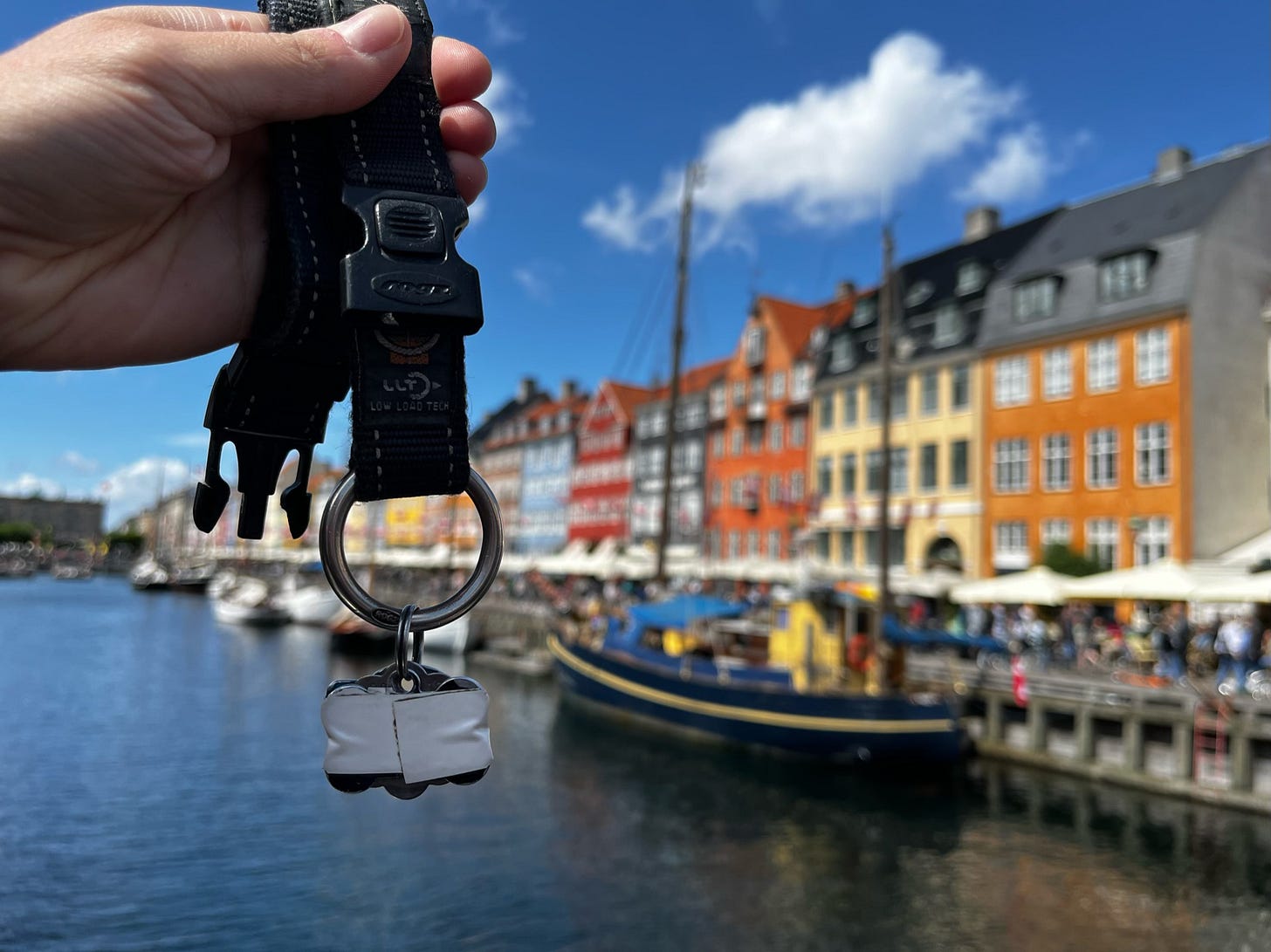
Longing
Related to loss is longing. Longing is not conscious wanting; it’s an involuntary yearning for wholeness, for understanding, for meaning, for the opportunity to regain or even simply touch what we’ve lost. Longing is a vital and important part of grief, yet many of us feel we need to keep our longings to ourselves for fear we will be misunderstood, perceived as engaging in magical or unrealistic thinking, or lacking in fortitude and resilience.
—Brené Brown, Atlas of the Heart
Dan Levy, the writer and director of the movie Good Grief, spoke in an interview about a question we often ask ourselves during grief, and I think it gets at the heart of our longings.
Where are you?
I feel this question in my bones as I carry Brooklyn’s collar across the world and find myself unable to spread her ashes where she deserves to rest, because it’s my only answer as to where she is:
She’s here. In her ashes. In her collar.
Loss is often so tangible and concrete. You had this one thing or idea or person and now it’s gone. Where did they go? Or maybe even more poignant, can I go with them?
However, the sometimes more painful reality is that we also lose something intangible with the tangible. We lose our motherhood, our siblinghood, our friendship. We lose that particular way of expressing ourselves and sharing this part of our identity that gave life color and meaning and purpose.
I’ve found this intangible loss is actually what leads me back to the tomb, often sitting there longer than I thought was “appropriate,” because it’s the only connection I have to what was once there. It’s the only connection to that part of myself.
On a Friday night in January, I was out with Cameron on a pathetic post-week-of-having-the-flu walk when we came across a four month old poodle. Her owner graciously let us shower her with pets, which is divine healing I will never be able to put into words. It was a moment of pure joy. However, it wasn’t twenty seconds after we turned our backs to the poodle and walked in the other direction that I began to weep. Bent over uncontrollable weeping.
My soul and body knew the truth in this moment. The thing that was going to heal me and put me back together from all this loss was loving an animal, and not someone else’s animal, but my own. The thing that was going to make me feel whole again was being a dog mama again.
I needed a dog so badly, and yet I couldn’t have one because, thanks to all the other things in my growing pile of loss, we didn’t have a home. Our lives had no way of supporting a new puppy, and we had no idea when they would. It felt cruel to be kept from the thing I most needed. This reality only compounded the anguish.
The next day, Cameron and I went to IKEA to dream of a new home in a someday future where we might have our own couch or bookshelf again. At the end of the showroom section—in the children’s area, mind you—were eight bins filled with stuffed animals. He picked up two and asked me which I was going to buy. I thought it was ridiculous. I was a 30 year old woman. We were not buying a stuffed animal.
Cameron, however, was not going to let me leave that day without buying one.
Side note: I pray that everyone who is grieving has a stubborn spouse or friend like Cameron. He has given me the space to grieve and do the weird things that grief leads you to do. He talks to me in the voice we gave Brooklyn. He “took her out to pee” with me the morning after we put her down. I am so grateful for him.
I carried this new stuffed animal puppy (her name is Maichen1) to the car and she sat with me on my lap. Within 20 minutes of owning her, I was crying as I admitted to Cameron, “it’s stupid how much this works.” We have travelled across the country with her, I sleep with her every night, and she is in my arms as I type this very sentence. She has not left my side in six months.
I am 30 years old and own (and named) a stuffed animal dog that has brought me more peace and comfort than I would like to admit.
She has become an outlet for this deep longing to have an animal companion, a confidant, to be a dog mama again. She has somewhat filled the void in our family. She has given us hope for our future doggo and our future life that we have had little imagination for most days.
This is how the longing has shown itself in my life. It makes no sense. I feel embarrassed to share it. But it’s so damn real to me.
Amidst all the intangible loss this year has brought, these are the things I’ve been able to hold on to. The things I can control. The things keeping me above water.
Brooklyn’s collar. Her ashes. A stuffed animal dog.
What are we supposed to do with these longings of our hearts?
The only thing we can do: Let them out, in all their strange, embarrassing, illogical ways.
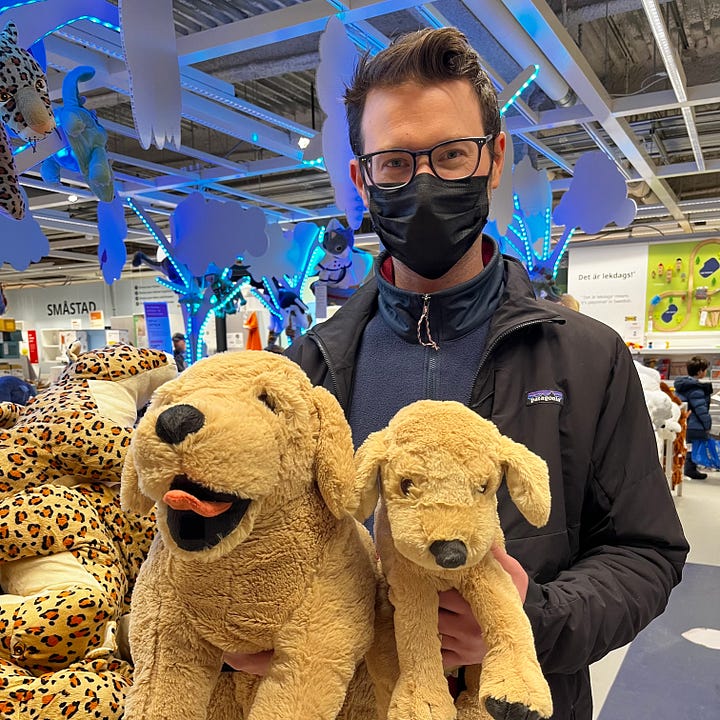
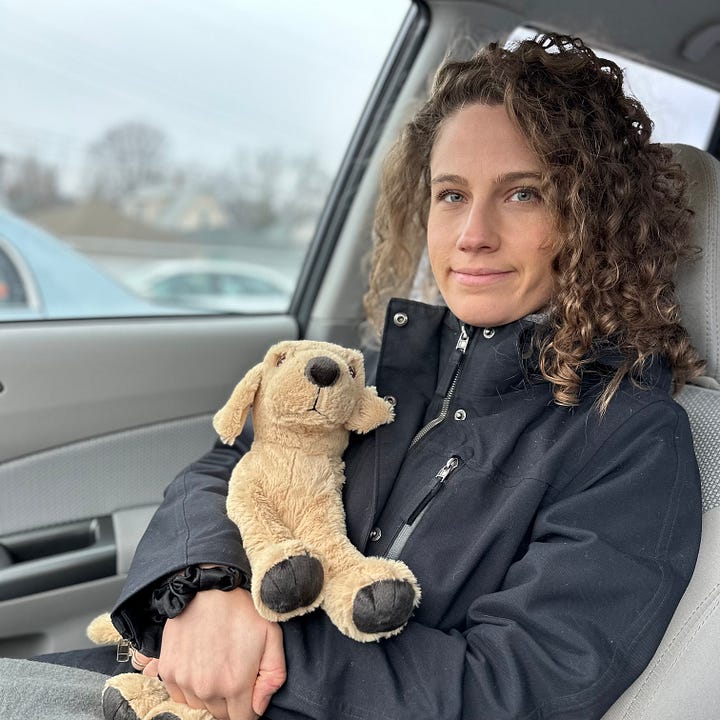
Feeling Lost
Grief requires us to reorient every part of our physical, emotional, and social worlds. When we imagine the need to do this, most of us picture the painful struggle to adjust to a tangible change, such as someone dying or moving away. But this is a very limited view of grief.
—Brené Brown, Atlas of the Heart
In one sense, the timing of Brooklyn’s death was a gift. Cameron and I would have never been able to move to Boston for three months if Brooklyn would have been alive. I would not have been able to do as many Preaching Fellowship visits or go to my friends’ ordinations if we were still caring for our extremely geriatric daughter.
That truth, however, did not relieve us from carrying a general heaviness around to the incredible places we were visiting. Throughout it all, we still felt a great void, an emptiness, a hole. We were traveling across the country—seeing amazing cities and ministries and family—but doing so without our best friend. We were on an endless adventure, but without our entire family.
When Cameron and I have travelled in the past, there would come a time in every trip where I would joke about how the only reason I choose to get on the plane home is to see Brooklyn. She has been what gets me to leave the beauty of Iceland or the Austrian Christmas markets. It’s not my apartment or bed or job that brings me home. It has always been Brooklyn. She’s been my grounding presence. She’s been the marker of my home.
This is why I’ve felt so lost this year. My soul has been wandering about this year wondering:
Where is home if she’s not there? Where do we even go “home” to if not to her? How do we reorient our lives while feeling completely lost? How do we find our new place in the world when the companion who was the marker of that is gone?
The physical reorientation to Brooklyn’s loss was forced upon us quickly. We no longer had to take her out to potty or feed her. Gone were the days of bribing her with loads of peanut butter to get all her old lady drugs down. The diaper routine was long behind us.
What lay before us now was the work of finding and building a home without her, all while not having a home of our own, and not really knowing what “home” meant.
This was our excruciating, painful, heart wrenching reality. I can’t count the number of times I’ve said “I’m so lost” in the past year. When there have been no words to communicate the depth of wilderness I’ve wandered, this is the only truth I can muster.
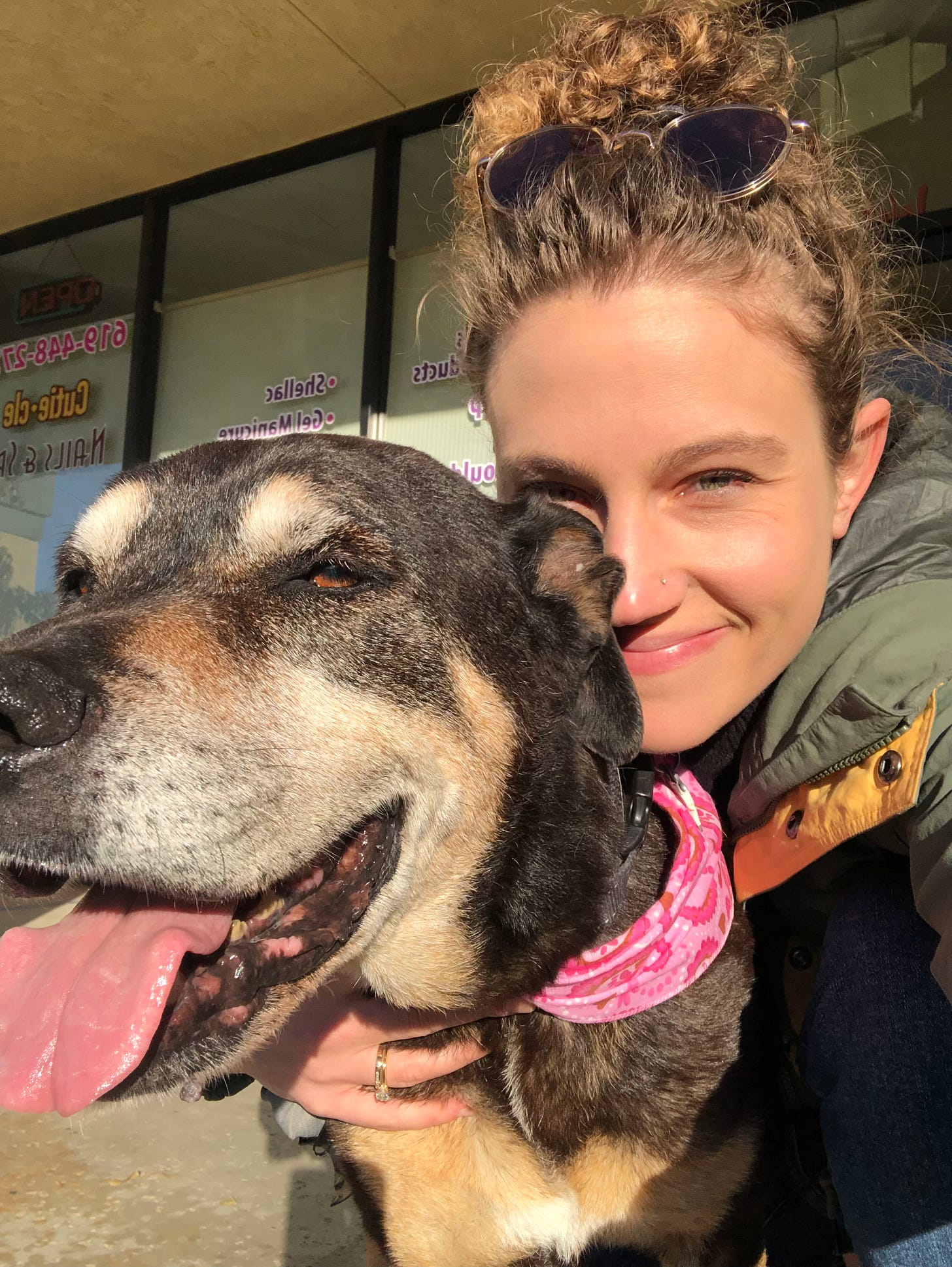
Making Meaning
A central process in grieving is the attempt to reaffirm or reconstruct a world of meaning that has been challenged by loss.
—Robert A. Neimeyer
David Kessler, who partnered with Elisabeth Kübler-Ross on developing the five stages of grief, proposed a sixth stage after experiencing the loss of his son. He explains how it might be the most important part of grief, but cannot be rushed or even fully understood.
This sixth stage is making meaning.2
For a long time, I rejected looking for any meaning in all this loss, unable and unwilling to walk away from the tomb. It takes a long time to get to this stage, but at some point, you wake up and realize you can’t live at the tomb forever. And more than that, you start to believe that your companion wouldn’t want you to.
Making meaning, however tiny and pathetic it might be, has become the only way to keep waking up, to keep going while knowing I will never be on the receiving end of her sloppy kisses again.
Now, I cannot sit here and tell you that I’ve uncovered any meaning from the loss of my beloved. It’s still a work in progress. It might always be a work in progress. I have to believe the same was true for Job, even after he was given a new home and family. Loss of this magnitude may forever be just as mysterious as the God who gave us these gifts in the first place. This search of mine for meaning has felt messy and incomplete and not enough.
But the little meaning I have experienced has come through processing, sharing, feeling, and writing about it.
It’s come through many many many many tears.
It’s come through feeling everything fully, because Brooklyn deserves that.
It’s come through feeling connected to others who are grieving, experiencing our common humanity, and receiving others’ stories of loss, longing, and lostness.3
I think that’s why I feel the need to share my own grief with you, because I have been hospiced along this journey by those who have shared their own experiences of grief. They have met my need for connection when I have felt so disconnected.4
As I sit here and look back on a year without Brooklyn—feeling like I haven’t “progressed” any further in my journey and continuing to heal from all Cameron and I have lost—I struggle with this stage the most. I wrestle with what making meaning looks like.
I so desperately want it to be a nice little bow that I can tie up and set aside, fully understanding why and how it all it happened. I want to feel some semblance of closure or peace. I want to know that we did the “right” thing and made the “right” decision for her.5
But I know that’s not realistic. I know in my deepest soul that I will never be the same after losing Brooklyn, and I will carry this void in my heart for the rest of my life, unable to fill it.
So, after a year of grief—after a year of great loss, deep longing, and constantly feeling lost—my hope for today is to have the strength to walk away from the tomb I’ve been living at, trusting that it’s not the end of the story. That I’m able to spread Brooklyn’s ashes in the forests and wilderness where she most came alive, knowing that I can always find her there.
And then learning, day by day, to hold the weeping Mary inside of me in love whenever she goes to visit the tomb.
That’s all I got. That’s the only meaning I can muster.
That, and knowing deep in my bones that my ten years with Brooklyn were worth a lifetime of this holy and sacred experience called grief.
She changed my life, after all.
To Brooklyn, my poochy pants, pooch booch, pee monster, squirrel hunter, first-one-to-the-top-of-the-mountain billy goat, and favorite old lady,
I needed you more than ever this past year, and you weren’t there. It’s been really hard to do this without you.
Please stay with us as we settle into a new home and guide us to another doggo that will make me feel whole and grounded once again.
Mama loves you.
♥️
Maichen is the Dutch name for Mary. It is the name of a dog we met in Visby, Sweden, seven days after we put Brooklyn down. It was the first dog we deeply connected to after Brooklyn’s loss, and her owner was incredible gracious with us and let us pet her for a long time. From then on, we knew Maichen would be the name of our next dog, as she was the one who came to us in our deepest grief.
This is a great intro podcast to his work, story, and understanding of grief. 10/10 recommend.
Though more needs to be written/shared about the hidden losses because most people only talk about the death of a human or loved one. We need to talk about disenfranchised grief. We need more spaces for that.
These include:
Ed Sheeran’s “-” (Substract) album was my most listened to album in 2023 and was incredibly healing and cathartic, most of the songs written in the midst of his own grief. His mini-documentary on Disney+ was equally comforting.
Nadia Bolz-Weber wrote this post two weeks after we put Brookie down, which beautifully put words to the Planet: Brooklyn Died that I was living on.
Brené Brown’s interview with David Kessler was incredibly permission-giving, though I shouldn’t have re-listened to it while driving.
Surprisingly, one of my favorite female finance gurus (Tory Dunlap) had a very personal podcast episode about her own grief that made me weep. Whew, that really sent me into the feels.
Our close friends in San Diego put their dog (Brooklyn’s “husband”) down one month after us, and our group chat is space where the grief and the memories and the pictures are always welcome.
If you can’t tell, I’m an Enneagram 1.


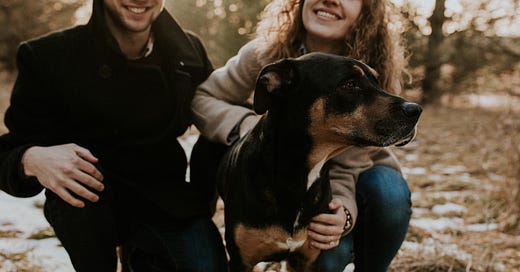





Beautiful! Thank you for your incredible writing - once again making me cry. Blessings and peace.
Jenna, thank you for bringing Brooklyn to the forefront of our brains. Those of us who loved her, as you do, miss her very much. She was such an incredible dog, you and Cameron were her #1's, with squirrels a close second. You two were amazing pet parents and you will be again soon.❤️( this one was a tear jerker for sure 😢)